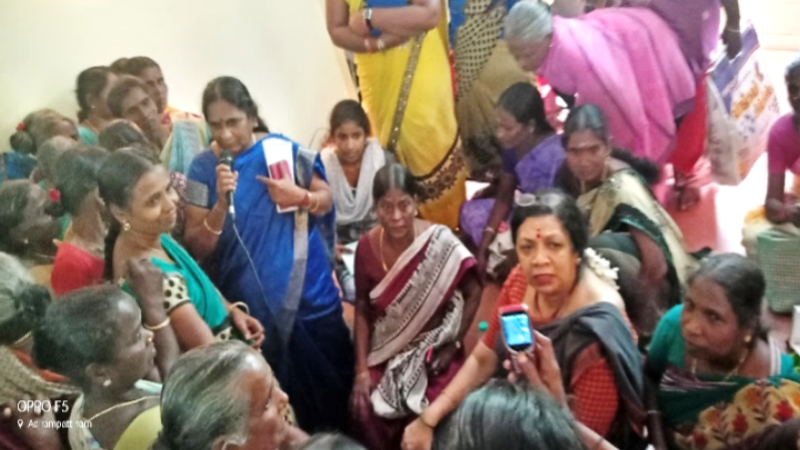by Indian Cooperative Network for Women (ICNW)
Description
Climate change in India have profound effects, ranked 4th among the list of countries affected from 1996 to 2015. Climate change hit India hard, causing huge economic and social losses due to severe floods, cyclones, heat waves, droughts and landslides causing death and destruction. Rain-deficit monsoon, unseasonal rains, increasing Green House Gases have disturbed the crop cycles. Drastic climate changes affected crop growth and yields severely increasing pest or insect population, by devastating overall productivity.
Indian cooperative network for women (ICNW) took up the counselling and advocacy work, by supporting rural women through financial inclusion in cooperatives. Gender in agriculture is important in order to eradicate poverty, ensure food security, promote theirs and family wellbeing.
In response to climate disasters, rehabilitation measures were distributed: community-based kitchen were mobilized and food packets were distributed to relief victims of extreme weather events, women were involved in the promotion of kitchen gardens as it helps them grow enough food for household (surplus used at home or sold for income). It addresses not only food security, malnutrition issues but also generates incomes in these crises. Animal husbandry is a second important source of income for farmers. Traditionally, farmers stored animal dung in pits, acting as a good fertiliser for the soil. The ICNW supports this traditional method of the compost pit which plays a double role during the crisis (ensuring organic food). Also, ICNW members are involved in the agriculture, particularly in the processing sector such as cultivation of crops like paddy, groundnut, sugarcane etc. which help women farmers to develop bargaining power within the family farming structures and to nurture collective responsibility. ICNW also provided alternative skill training which facilitated women in processing / preparation of agro products and other processing such as dried vegetables, peanut balls, puffed rice, leaf plates, rice snacks etc.
ICNW developed support services by providing employment programme to procure banana, tamarind & chillies from villages and sell them to rural markets and nearby fairs also rearing of livestock and dairy production to ensure continuous income.
Results
The success of the ICNW experiment demonstrates how farmers women learned to make their own decisions through collective consciousness and demonstrated their process of self-help and self-management despite being marginalized and vulnerable. ICNW strengthened not only their economic roles by improving their existing skills but also provided them with new skills. The innovative and inclusive programme has enabled the poor women farmers to lift themselves out of hunger and poverty. By joining the cooperative, women have been included in an empowering environment to participate at all levels in governance, whether in the event of pandemics or devastating annual cyclones or floods.
Climate smartness*
This case depicts a model to increase farmers adaptation capacity to manage, avoid and withstand climate risk and hazards, particularly women’s empowerment in cooperatives leads to diversification of income sources, economic growth and poverty reduction while promote gender inclusion and equity. Kitchen gardens play a key role in ensuring food and nutritional security with co-benefits in health, marketing opportunities, and in rescuing and maintaining agro-biodiversity. Home gardens and compost pits are simple yet powerful practices with synergistic effects, as crop residues from home gardens can be used as inputs for the compost pits and the compost produced can be recirculated as organic fertilizers, hence reducing the level of dependency of external inputs. Additionally, water efficient irrigation systems (e.g., drip irrigation) and rainwater harvesting techniques (storage thanks made of different materials) are essential to maintain or increase productivity. Likewise, diversification with livestock (poultry, pigs etc.) have the potential to balance family diets, women’s economic conditions and decision-making. These practices can also be scaled-up by implementing them in a community basis, increasing the options to generate new revenue opportunities, such as establishment of biodigesters (at different scales) as an alternative energy source for cooking—with potential reductions in methane emissions—or strengthening food processing and value addition (dried vegetables, peanut balls, puffed rice, leaf plates, rice snacks, and milk by-products (ghee [clarified butter], yogurt, butter, etc.). Nevertheless, this requires constant education and technical support either through ICNW or in collaboration with agricultural sector stakeholders.


